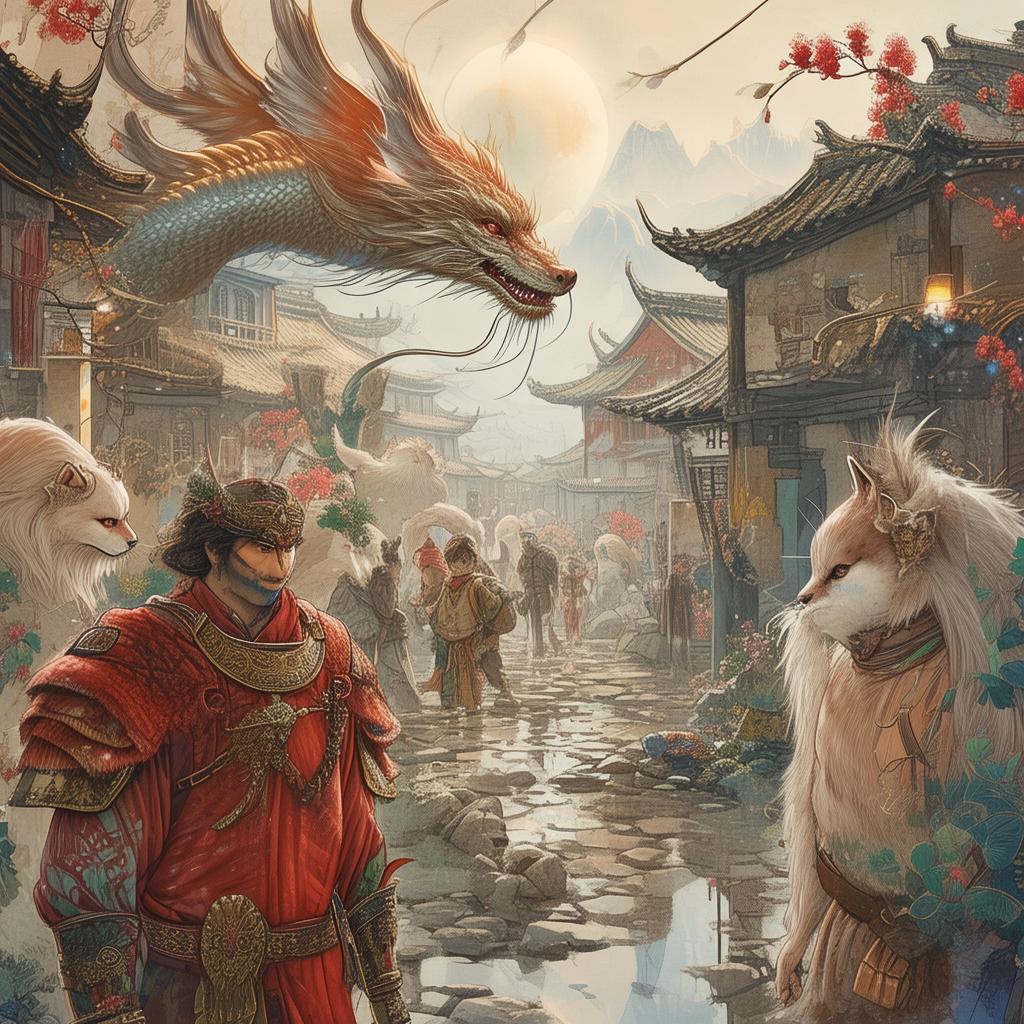The Echoes of Eternity: The Lament of the Ancestor’s Soul
In a remote village shrouded in mist and mystery, the people spoke in hushed tones of The Ancestor's Lament—a tragic opera performed in the afterworld. The tale was said to be the lament of an ancestor whose soul remained trapped in the realm of the dead, unable to rest. The story had been passed down through generations, a cautionary tale of the consequences of neglecting one's ancestors.
The protagonist of this haunting narrative was a young villager named Ling, whose life was forever changed when she stumbled upon the ancient, crumbling ruins of the opera house. The building stood as a testament to a bygone era, its once vibrant murals now faded and its wooden beams rotting with age.
One stormy night, driven by a curious spirit and the whisper of the wind, Ling pushed open the creaking doors of the opera house. The air inside was thick with the scent of damp earth and old wood. She wandered through the dimly lit corridors, her footsteps echoing softly against the walls. Finally, she reached a room where a faint glow emanated from the shadows.
Ling stepped closer, her eyes widening in awe as she beheld a grand stage adorned with intricate carvings of souls in eternal sorrow. The air was charged with an otherworldly energy as the opera began to play—a haunting melody that seemed to seep into her very being.

The story of The Ancestor's Lament unfolded before her eyes, revealing the tale of a noble ancestor named Ying. Ying had lived a life of unparalleled generosity and kindness, but in his final moments, he had failed to pay his respects to his departed parents. Overwhelmed with guilt and sorrow, Ying's spirit remained trapped in the afterworld, his lamenting voice echoing through the realm.
As the opera progressed, the characters came to life before Ling's eyes. Ying's parents, once proud and honored, were now reduced to shadows, their faces etched with despair. The story reached its climax when Ying's soul, in a moment of desperation, reached out to his living descendants, imploring them to fulfill his last wish—to pay their respects to the ancestors.
Ling, moved to the core by the tragedy of Ying's undying lament, vowed to uncover the truth behind the story. She began to research the village's history, interviewing the oldest members of the community. It was then that she discovered the truth—the village had once practiced a sacred ritual of ancestor worship, but over time, it had been forgotten.
With renewed determination, Ling organized a gathering to revitalize the ancient tradition. The village elder, an old man with eyes that had seen many seasons, nodded with approval. "It is time," he said, "for us to remember our ancestors and honor their memory."
The day of the ritual arrived, and the village was abuzz with anticipation. The people gathered in the opera house, their faces illuminated by the flickering candlelight. As Ling recited the ancient incantations, the air grew thick with the presence of the departed spirits. The opera house, once a place of sorrow, was now filled with the warmth of remembrance.
As the ritual concluded, a hush fell over the crowd. Suddenly, a soft, melodious voice echoed through the room, a reminder of Ying's undying lament. But this time, the voice was joined by others, a chorus of ancestors whose souls had finally found peace.
Ling felt a profound sense of relief wash over her. The ancestors had been heard, and their spirits had been set free. The village had returned to its ancient ways, and the bond between the living and the departed had been restored.
In the years that followed, The Ancestor's Lament became a reminder to the villagers of the importance of honoring their ancestors. The opera house was renovated, and the tragic tale was performed once more, this time with a sense of hope and fulfillment.
Ling, now a respected elder in her own right, often shared the story of her journey with the young villagers. She knew that the tale of Ying's undying lament would continue to echo through the ages, a testament to the enduring power of remembrance and respect.
As the story of The Ancestor's Lament unfolded, it became clear that the bond between the living and the departed was not a mere superstition, but a profound connection that transcended time and space. The tale served as a reminder that the spirits of the ancestors were always close, watching over the living, and waiting to be remembered.
✨ Original Statement ✨
All articles published on this website (including but not limited to text, images, videos, and other content) are original or authorized for reposting and are protected by relevant laws. Without the explicit written permission of this website, no individual or organization may copy, modify, repost, or use the content for commercial purposes.
If you need to quote or cooperate, please contact this site for authorization. We reserve the right to pursue legal responsibility for any unauthorized use.
Hereby declared.








